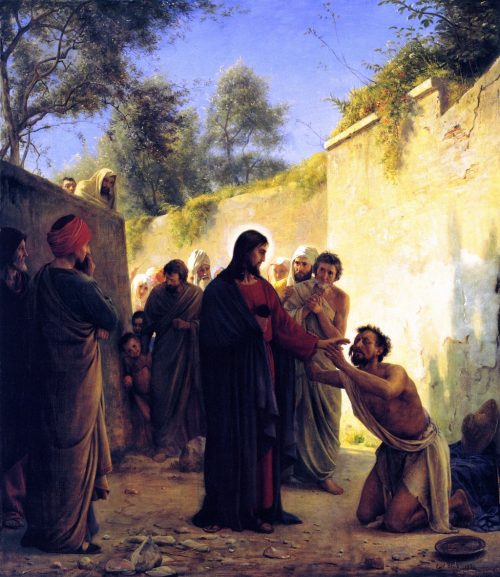
Do you have eyes to see?
I’m happy to have as my guest today Lacie Phillips…. More about her below:
Recently, I heard a sermon that did what every good teaching can do: it made me think deeply. The text for the message was Mark 10, at the end of which we meet Bartimaeus—son of Timaeus—a blind beggar.
As Jesus, his disciples, and a crowd are leaving Jericho, they cross paths with Bartimaeus sitting by the side of the road. When he hears that Jesus is near, Bartimaeus cries out, “Jesus, the son of David, have mercy on me.” The crowd responds by scolding Bartimaeus and telling him to be quiet; but a second time he shouts out to the Lord for mercy. Jesus halts the throng and asks them to call Bartimaeus forward. Suddenly, the crowd shifts their rhetoric from chiding to excitement as they tell this man to have courage and get up! So, he throws off his cloak, jumps up, and approaches his Savior. And the Lord meets him with an unconventional question: “What do you want me to do for you?”
I’m grateful Mark included Jesus’s profound question. Because the obvious answer is “Heal me,” right? So why did Jesus even have to ask? Perhaps because he knows something many American Christians have yet to have the privilege of learning: Disability has value.
Often we reduce Bartimaeus to an example—a powerful show of Jesus’s miraculous authority over every broken part of our world. Yet have we considered that there might be more to the story?
I appreciate that Mark uses person-first language as he quotes Bartimaeus, and he does the same for Jesus:
Bartimaeus: “Have mercy on me!”
Jesus: “What do you want me to do for you?”
Bartimaeus: “Rabbi, I want to see.”
And we see dignity in the descriptions: Bartimaeus, son of Timaeus, a blind beggar. Jesus, son of David, merciful: person, relationship to others, attribute. I think Mark uses such parallel structuring to highlight the kinship between Jesus and Bartimaeus. While the crowd sees Bartimaeus for his need, Jesus connects to the dignity of his humanity.
In his book Tattoos on the Heart: The Power of Boundless Compassion, Gregory Boyle writes, “Kinship is not serving the other, but being one with the other. Jesus was not ‘a man for others’; he was one with them. There is a world of difference in that.” Indeed, sadly, in the shadow of Jesus’s words to his disciples that the Son of Man came to serve rather than be served—and in our fragile, holy attempt to imitate Him—we’ve inadvertently created an “us/them” mentality: those who serve and those in need of serving. Yet the truth is that regardless of citizenship, race, sexuality or ability, all humanity has the distinct privilege of bearing the image of the Most High.
There is a world of difference in seeing Bartimaeus primarily as a blind beggar versus seeing him primarily as an image-bearer of God with a unique giftedness and purpose. Unfortunately, throughout history, we’ve had a poor track record at recognizing this value. There is often a disconnect between the God-assigned dignity of humanity and the way we’ve handled scripture’s verses about the disabled as we’ve retold their stories.
For a moment can we imagine ourselves in the crowd surrounding Bartimaeus and Jesus? Are we shushing Bartimaeus’s voice because we deem him unworthy of Jesus’s time? Or do we listen to Bartimaeus’s story and cheer him on? When Jesus stops the procession to call Bartimaeus forward, something changes and the crowd reverses their initial response. Maybe they put themselves in his shoes and relate to his circumstance. Maybe they are just curious to see what will happen. But either way, their sudden encouragement prods Bartimaeus to run to Jesus. He has become one of them. Do we do that for others?
It’s time to reexamine our willingness to go beyond serving to finding kinship with the marginalized. Can we too move from being spiritual gatekeepers to lavish welcomers and bridge-builders who usher all who are willing to the feet of Jesus? If we take the time to seek out the stories of people to whom we may not immediately relate and to find in those stories lives full of joy, triumph, loss, giftedness, and purpose, we just might find we have much in common. As Father Boyle so wisely put it, “Compassion isn’t just about feeling the pain of others; it’s about bringing them in toward yourself. If we love what God loves, then, in compassion, margins get erased. ‘Be compassionate as God is compassionate,’ means the dismantling of barriers that exclude.”
—Lacie, daughter of Mary Lou and Roger, amputee




One Comment
Pingback: